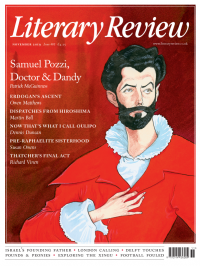Hannah Rosefield
Matters of Debate
The Topeka School
By Ben Lerner
Granta Books 284pp £16.99
We meet Adam, the main character in The Topeka School, as a teenager in the mid-1990s. He is on a boat in the middle of a lake with his girlfriend, Amber. Without looking at her, he talks ‘for a long time’ about his feelings. Turning to see the effect of his words, he finds Amber gone: at some point during his speech, she has dived off the boat and swum to shore. He docks the boat and finds her; she tells him about her stepfather, who used to give ‘endless speeches at dinner’, answering his own questions, heedless of everyone around him. Once, during such a dinner, she slid lower and lower in her chair until she was underneath the table, before crawling away. Her stepfather, oblivious, continued talking ‘to the air like AM radio’. ‘It would take Adam twenty years’, the narrator tells us, ‘to grasp the analogy.’
It’s a clever opening, one that sets the tone for the novel’s impressive investigation of gender and language. It also betrays a certain anxiety. Lerner’s two previous novels, the highly acclaimed Leaving the Atocha Station and 10:04, are both narrated by privileged white male writers who discourse, in eloquent and neurotic detail, on the role of art in times of political crisis, the ability of language to convey meaning and the difficulty of building and sustaining relationships. The Topeka School, which shares these concerns, is Lerner’s first novel since 2014, and times have changed since then: the world, or at least the world that has heaped such praise on Lerner, believes itself less tolerant of privileged white men pontificating.
In one sense, The Topeka School, like its predecessors, is narrated by a stand-in for Lerner himself: the adult Adam, now a writer living in Brooklyn, is writing a novel in which he describes his younger self in the third person. But in another sense, the author figure

Sign Up to our newsletter
Receive free articles, highlights from the archive, news, details of prizes, and much more.@Lit_Review
Follow Literary Review on Twitter
Twitter Feed
Under its longest-serving editor, Graydon Carter, Vanity Fair was that rare thing – a New York society magazine that published serious journalism.
@PeterPeteryork looks at what Carter got right.
Peter York - Deluxe Editions
Peter York: Deluxe Editions - When the Going Was Good: An Editor’s Adventures During the Last Golden Age of Magazines by Graydon Carter
literaryreview.co.uk
Henry James returned to America in 1904 with three objectives: to see his brother William, to deliver a series of lectures on Balzac, and to gather material for a pair of books about modern America.
Peter Rose follows James out west.
Peter Rose - The Restless Analyst
Peter Rose: The Restless Analyst - Henry James Comes Home: Rediscovering America in the Gilded Age by Peter Brooks...
literaryreview.co.uk
Vladimir Putin served his apprenticeship in the KGB toward the end of the Cold War, a period during which Western societies were infiltrated by so-called 'illegals'.
Piers Brendon examines how the culture of Soviet spycraft shaped his thinking.
Piers Brendon - Tinker, Tailor, Sleeper, Troll
Piers Brendon: Tinker, Tailor, Sleeper, Troll - The Illegals: Russia’s Most Audacious Spies and the Plot to Infiltrate the West by Shaun Walker
literaryreview.co.uk